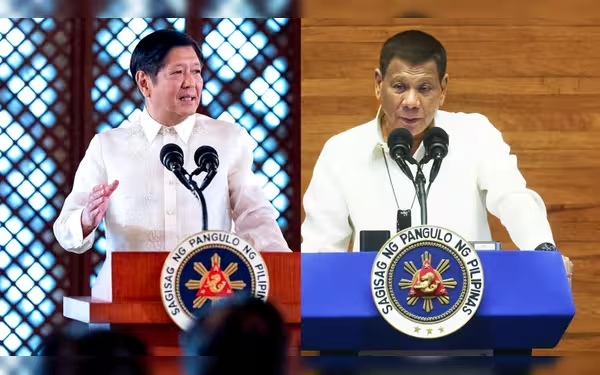Saturday, November 16, 2024 05:59 PM
Philippines Faces Political Turmoil Amid US-China Rivalry
- Fishermen struggle due to escalating maritime tensions.
- Philippine President adopts a tougher foreign policy.
- US-China rivalry significantly impacts local livelihoods.
 Image Credits: channelnewsasia
Image Credits: channelnewsasiaThe Philippines faces political turmoil as US-China rivalry escalates, impacting fishermen and maritime rights.
In recent years, the political landscape in the Philippines has become increasingly complex, particularly due to the ongoing rivalry between the United States and China. This geopolitical tension has significant implications for the Philippines, especially concerning its maritime rights and the livelihoods of its fishermen. The South China Sea, a vital waterway rich in resources, has become a focal point of conflict, with both China and the Philippines asserting their claims over various territories.
For over fifty years, Efren Purones, a fisherman from Zambales, has relied on the sea for his livelihood. However, his recent experiences reflect a troubling trend. “We spent hours here. But look, this is all we got,” he lamented, showing the few fish he managed to catch. The situation is dire, and many fishermen like him are struggling to make ends meet. Just 200 kilometers away lies Scarborough Shoal, a location he believes could provide a bountiful catch. Yet, the fear of confrontation with Chinese vessels keeps him from venturing there.
The tensions in these waters have escalated dramatically over the past year and a half. Incidents involving Chinese coastguards and Philippine troops have become more frequent, with one notable clash resulting in a Philippine Navy sailor losing a thumb. Such confrontations occur within the Philippines’ 200-nautical-mile exclusive economic zone (EEZ), an area that is rightfully theirs according to international law. However, this zone overlaps with the vast claims made by China, which has increased its coastguard presence to assert control over the region.
Political analysts have observed that these tensions have intensified as Philippine President Ferdinand “Bongbong” Marcos Jr has shifted away from the more lenient approach of his predecessor, Rodrigo Duterte. “Marcos Jr pursued a harder foreign policy, which meant that Marcos Jr was more assertive in defending the Philippines’ rightful maritime claims,” noted Edcel Ibarra, an assistant professor of political science at the University of the Philippines. This change in policy reflects a growing determination to stand up against external pressures and protect national interests.
The implications of this political war extend beyond the fishermen and their daily struggles. The ongoing rivalry between the United States and China plays a crucial role in shaping the Philippines' foreign policy and its approach to maritime disputes. As the Philippines navigates these turbulent waters, it must balance its relationships with both superpowers while ensuring the safety and security of its citizens.
The situation in the South China Sea is a stark reminder of the complexities of international relations and the impact they have on ordinary lives. As tensions continue to rise, it is essential for the Philippines to assert its rights while seeking peaceful resolutions to conflicts. The future of its fishermen, like Efren Purones, depends on the ability of the government to navigate these challenges effectively, ensuring that their livelihoods are protected amidst the geopolitical storm.













